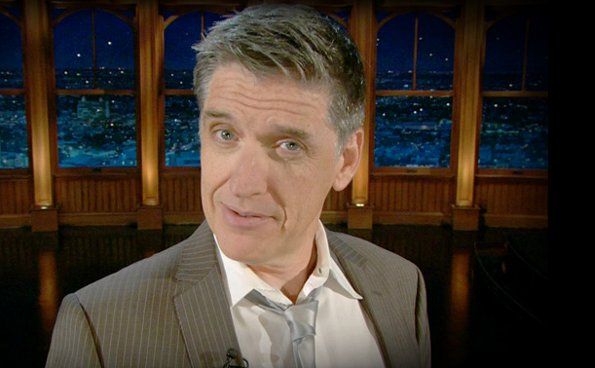
Craig Ferguson
If you happened to be channel surfing on a random weeknight and landed on The Late Late Show, you might have found a cheeky Scot bantering with a gay robot skeleton named Geoff Peterson. Or perhaps he was dancing with two guys wearing a horse costume, collectively known as Secretariat, naturally.
It might resemble a twisted late-night version of Pee-wee’s Playhouse, but during the decade it’s been on air, The Late Late Show with Craig Ferguson has transformed into a brilliant deconstruction of the late-night format, led by Ferguson’s natural charm, sharp wit and contempt for the status quo.
You see, despite abandoning his reckless youth long ago, Ferguson never gave up his attitude as a punk rock drummer (fun fact: He’s in a band with Doctor Who’s Peter Capaldi). This has become increasingly evident as his tenure as host of The Late Late Show has gone on, with Ferguson growing more honest and defiant about what the network or key demographics have come to expect from a late night talk show.
With that said, come Dec. 19, when Ferguson’s run will come to an end, I won’t see it as the sad conclusion of an excellent show but a miracle CBS let it continue for nearly 10 years. This is because Ferguson’s format eschewed the ratings-baiting and viral video-friendliness of other late night shows in favor of recurring bits, creative interviews and general wackiness.
Part of appreciating The Late Late Show with Craig Ferguson comes from insider knowledge of the program. A first-time viewer might find Ferguson’s antics confusing and hard to follow. But Ferguson’s routine is largely the same night after night — he’ll deliver a monologue with some assistance from his sidekick Geoff Peterson (voiced by the multitalented and unheralded Josh Robert Thompson, who even impressed Morgan Freeman with his skills). Then Ferguson will retire to his desk to read tweets and emails, which mostly consists of Ferguson performing long-running but ever-changing bits (recently, an old-timey phone and something called a “Jay Leno fly”).
Ferguson’s interviews, however, remain his finest work as host of The Late Late Show. Instead of asking guests predetermined questions and helping promote their latest projects, Ferguson opts for a more free-flowing, thought-provoking and sometimes silly alternative. To bolster the idea of a decidedly anti-talk show interview, Ferguson ceremonially rips up the card with preordained topics before he speaks with his guests.
The results are fascinating, as even the dullest celebrities liven up when Ferguson puts them on the spot with his off-kilter interviewing style, which finds celebrities participating in awkward pauses or trivia games for laughs. Most of the time, the guests are game, and The Late Late Show consistently brings back those who have developed good chemistry with Ferguson, such as Kristen Bell (House of Lies), Betty White (Hot in Cleveland) and Larry King.
Ferguson regularly invites writers on his show, from authors like Salman Rushdie and Jackie Collins to journalists like Joel Stein and Lynette Rice. It’s clear Ferguson isn’t afraid to shy away from deep, thoughtful conversation, like in recent interviews in which he mourned the death of Robin Williams with Joel McHale (Community) or discussed gender politics with Egyptologist and UCLA professor Kara Cooney. The Peabody Awards even awarded The Late Late Show in 2010 after Ferguson dedicated an episode to exploring the complicated history of South Africa with Archbishop Desmond Tutu.
Somehow, the balance of naughty foreigner and deep thinker worked for Ferguson because, in his duties as a late night host, he was always true to himself. Take an instance in 2007 when he vowed to not do jokes about Britney Spears during her public meltdown, citing his own past struggles with addiction. He also rerecorded an introduction to an episode after the 2012 shooting in Aurora, Colorado, to speak from the heart and reflect on the tragedy rather than ignore it. It’s this kind of thoughtfulness and introspection that made Ferguson special in his role.
Sure, this honesty could come off as jaded or flippant at times, especially as Ferguson is eying the finish line of his tenure, but his inability to censor himself is admirable. He has no inhibitions about mocking advertisers, exposing the larger objectives of a late night talk show and cursing freely (in the most charming way possible) on his program so that he can amuse himself as much as his audience.
That’s why the show garnered a cult following, and why I did my best to frequently visit Ferguson in the peculiar post-midnight hours, or at least keep up on YouTube during college. As far as the legacy of The Late Late Show with Craig Ferguson, I’m reminded of the Groucho Marx quote that Ferguson himself cited from time to time: “I don’t want to belong to any club that will accept me as a member.”
This combination of rebelliousness and self-deprecation captures why Ferguson thrived in his position — in an increasingly homogenized late-night landscape, he refused to blend in, even if his brilliant efforts went largely unnoticed.



